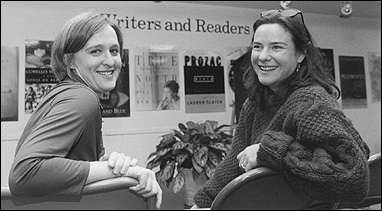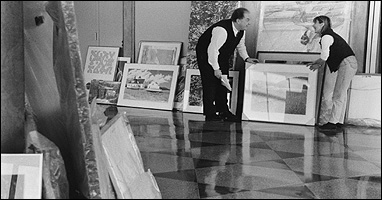![]()
Departments
Arts
![]()

|
Week of 8 January 1999 |
Vol. II, No. 18 |
Arts
|
|
|
Julie Rold (left) and Eve
Bridburg earned their master's degrees in the
graduate Creative Writing Program and then joined
forces to establish Grub Street Writers, an
independent school of creative writing in Boston.
Photo by Kalman
Zabarsky
|
By J. Nicole Long
Grub Street, the hangout for "mean and needy hack writers" of 18th-century London, has only one thing in common with Grub Street Writers in 20th-century Boston -- it's easy to get in.
Grub Street Writers -- with a capital W -- is a school founded by two BU alumnae that teaches students how to render their drama, clarify their stories, and enliven their style. In existence only since 1997, Grub Street can already boast at least one success story: Jamie Katz's novel Dead Low Tide. "He had been working on it for about five years and the book was continually rejected," says Eve Bridburg (GRS'96), co-founder of Grub Street. "When he enrolled for our Fiction II workshop, he was able to receive feedback on the whole novel because it was a small class. He revised it chapter by chapter and sent it off again."
Harper Paperbacks gave Katz a two-book contract, and he is currently at work on the second.
Bridburg and Julie Rold (GRS'96), both fiction writers, discussed the possibilities of a profit-earning school of creative writing while completing their master's degrees from the BU Creative Writing Program.
Writing on the run
"Our purpose is to provide writing instruction for
students who don't have time or money to attend traditional
degree programs," Rold says. Universities across the country
offer master of fine arts degrees in creative writing, says
Bridburg, and Grub Street workshops are based on these
models. Workshops differ from literature classes because
student work is used as the primary text for the class.
Students focus on elements of craft, such as how to create a
character or what decisions guide how poets end a line of
verse.
Classes are held at Coolidge Corner in Brookline and Downtown Crossing in Boston from 7 to 10 in the evening to accommodate working people. Rold actively supported her friend's initiative, but she credits Bridburg for most of the administrative legwork.
Bridburg says all the instructors are free to teach in their own style, but most guide students through the writing process by giving short lectures and critiquing students' work. Rold, for example, assigns published stories as a springboard for discussion or illustration of an assignment. And, she says, she encourages her students to dream. "Writers desire to contribute to hidden experience, unassociated with money and fame," she says. "Writers want to affect people."
The fold now tenfold
Grub Street began with two instructors and had eight
students registered for fiction writing. Now 14 instructors
teach approximately 95 students fiction, poetry, screenplay
writing, creative nonfiction, sit-com writing, and
playwriting in workshops of no more than 14 students. The
student population ranges from young adults in their early
20s who have dropped out of college specifically to pursue
writing to a lawyer working for the State's Attorney's
Office. Grub Street also offers one-day seminars, manuscript
consulting with one-on-one sessions, and an editing service.
Bridburg has no formal training in business, she says, but she does have some experience from working with nonprofit organizations. "I don't believe in the nonprofit mystique," she says. "There are monopolies in that world too."
With no grant money to run the school, Bridburg says that she is forced to be more creative in finding ways to earn the money and more cautious about expenditures. One method she uses is bartering in exchange for tuition. Former student Lance Gensen has offered his skills as an advertiser. He currently works for Arnold Advertising in Boston, the firm responsible for the VW Drivers Wanted campaign.
A hand out to teens
Grub Street is also involved in community service.
Bridburg and Tom McNeely, instructor of screenplay writing,
volunteer with Teen Voices, which publishes a magazine by
at-risk inner city adolescents and functions as a placement
agency. The magazine includes original student work, and
Bridburg and McNeely donate a two-part seminar in fiction
for the students.
Bridburg's commitment to the craft of writing impels her to provide a forum for beginning writers, but she is also an artist in the process of establishing herself. "I want to offer workshops that are fun, down-to-earth, and, at the same time, disciplined and serious. But the instructors are published, talented people trying to establish themselves. I wanted to find a way for us to have financial support while we're in this process."
Bridburg has taught fiction, poetry, and playwriting at BU and English at Massachusetts Communications College. Before coming to Boston, she lived in the Czech Republic for several years, where she helped launch an international bookstore and wrote for English language publications. She has received fellowships to the Prague Writers' Workshop and to Boston University's Creative Writing Program. In addition to running Grub Street Writers, she is currently at work on a novel.
Other side streets
Rold's recently published short story "Bloodlines" has been
translated into Serbian. She has reviewed Þction for
the Boston Book Review, taught Þction workshops at
Boston University, and lectured on craft at Emerson College.
Her writing has earned her fellowships to the Millay Colony
for the Arts and the Ropewalk Writers' Retreat. In addition
to teaching at Grub Street, she is on the liberal arts
faculty at Berklee College of Music and is currently at work
on a collection of short stories.
When Rold and Bridburg decided to pursue writing seriously, they found workshops helpful to the development of their work and to the generation of ideas. There has been some criticism of workshops, however.
Well-known opponents such as Geoffrey Hill, poet and professor in The University Professors program, argue that workshops are responsible for the decline in quality of contemporary writing. They assert that the work becomes homogenized and lifeless.
In response to this line of reasoning, Rold says, "Writers will always seek a response, and gravitate toward people who will give them that."
|
|
|
At 808 Commonwealth Avenue, SFA Director of Development Leslie Dressler and BU Art Gallery Director John Stomberg catalogue the Miller Collection, which consists of more than 400 works. The collection, donated to SFA by John and Janice Miller (SFA'66), has been made available to Boston University administrative offices: SFA is lending the pieces to various departments over the next two years. Photo by Fred Sway |

